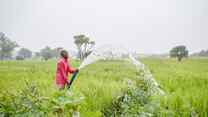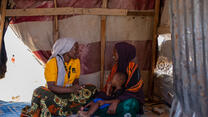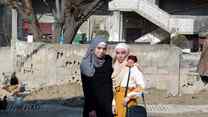In its 18th replenishment of the International Development Association (IDA18, covering 2017–2020), the World Bank made a game-changing decision to create a US$2 billion financing window to support lowincome countries hosting large numbers of refugees.1 This financing is significant for two key reasons. First, in its scale and scope, the Refugee Sub-Window (RSW) is responsive to both the programmatic and policy needs of protracted refugee crises. Second, in supporting both refugees and their host communities, the RSW aligns refugee responses with host countries’ national development plans.
Within its first three years, 14 countries became eligible for RSW financing,2 10 of which have projects that have been approved by the Bank’s Executive Board.3 Although it is still too early to say what impact the financing is having on the lives of refugees and their hosts, a number of other progress measures are evident. Beyond establishing new and expanding existing projects, this financing has incentivized, enabled, and supported significant changes in refugee policies in several countries: Ethiopia’s Refugee Proclamation, which creates a path for refugees to move freely outside of camps, attend primary school, and gain access to the labor market; Pakistan’s move to allow refugees to open bank accounts; and Chad’s first-ever national refugee policy that reflects the rights of refugees as laid out in the 1951 Refugee Convention. These policy shifts show the promise of the RSW.
Still, there remain areas where implementation of the financing could be strengthened. In some countries, financing has not been adequately leveraged to support shifts in the policy environment. Humanitarian and other development actors have valid concerns about the World Bank’s ability to address the unique needs of refugees, and about the Bank’s willingness to partner and meaningfully consult actors beyond its government clients. Success of the Bank’s engagement in these contexts ultimately needs to be measured in improvements in the lives of refugees and their host communities; however, these measurement frameworks remain absent.
The 19th replenishment of IDA (IDA19) offers an opportunity to renew and adjust the RSW to better ensure impact and measure progress. Drawing on observations to date, this policy note outlines changes that should be made to the RSW operating framework to inform World Bank practice in refugee contexts moving forward.
There are four areas where adjustments should be made: linking financing to policy reforms; defining and focusing on a common set of outcomes, targets, and indicators; engaging systematically and predictably with partners and beneficiaries; and investing in programs that are sensitive to refugees’ protection needs. To bolster outcomes, other donors, UN agencies, and the private sector partners will also need to more systematically coordinate and align their responses with the World Bank’s efforts in refugee contexts. Compact approaches, which bring a diverse set of stakeholders together to work towards shared outcomes based on comparative advantages and which bring policy and programmatic solutions to bear, hold the most promise for transformative change



